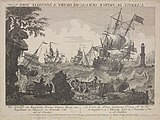HMS Prince George (1772)

| |
| History | |
|---|---|
| Name | HMS Prince George |
| Ordered | 11 June 1766 |
| Builder | Chatham Dockyard |
| Laid down | 18 May 1767 |
| Launched | 31 August 1772 |
| Honours and awards |
|
| Fate | Broken up, 1839 |
| General characteristics [1] | |
| Class and type | Barfleur-class ship of the line |
| Tons burthen | 1955 (bm) |
| Length | 177 ft 6 in (54.10 m) (gundeck) |
| Beam | 50 ft 3 in (15.32 m) |
| Depth of hold | 21 ft (6.4 m) |
| Propulsion | Sails |
| Sail plan | Full-rigged ship |
| Complement | 750 officers and men |
| Armament |
|
HMS Prince George was a 90-gun second-rate ship of the line of the Royal Navy, launched on 31 August 1772 at Chatham. During her career, she was upgraded to a 98-gun ship, through the addition of eight 12-pounder (5,448 g, 12.011 lb) guns to her quarterdeck.[1]
In 1780, Prince George was part of Rodney's fleet at the Battle of Cape St. Vincent.
On 12 April 1782 she was seventh in line in the attack on the French fleet at the Battle of the Saintes under the command of Captain Williams.[2]: 107
She fought at the Battle of Groix in 1795.
In 1807, Prince George, under Captain Woodley Losack, was in the West indies in the squadron under the command of Rear-Admiral Alexander Cochrane. The squadron captured the Telemaco, Carvalho and Master on 17 April 1807.[3]
In December Prince George participated in Cochrane's expedition that captured the Danish islands of St Thomas on 22 December and Santa Cruz on 25 December. The Danes did not resist and the invasion was bloodless.
Fate
[edit]Prince George was converted to serve as a sheer hulk in 1832. In 1835 she was used in a series of gunnery trials as a target ship, the results of which contributed to the rapid introduction of the shell firing gun.[4] The Prince George was broken up in 1839.[1]
Gallery
[edit]-
Prince William Henry arrives on the Prince George in New York on 16 Oct 1781.
-
His Royal Highness Prince William Henry, serving as Midshipman on board His Majesty's Ship Prince George, c. 1778.
References
[edit]- ^ a b c Lavery, Ships of the Line Vol. 1, p. 179.
- ^ Fraser, Edward (1904). Famous fighters of the fleet; glimpses through the cannon smoke in the days of the old navy. London: Macmillan. OCLC 1345782.
- ^ "No. 16236". The London Gazette. 11 March 1809. pp. 330–331.
- ^ Brown, Before the Ironclad, p133f
Sources
[edit]- Lavery, Brian (2003). The Ship of the Line – Volume 1: The development of the battlefleet 1650–1850. London: Conway Maritime Press. ISBN 0-85177-252-8.
- Brown, David K. (1990). Before the Ironclad: Development of Ship Design, Propulsion and Armament in the Royal Navy, 1815–60. London: Conway Maritime Press. ISBN 9780851775326.


